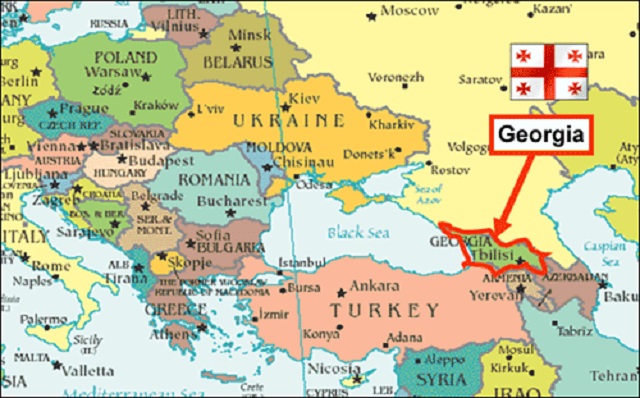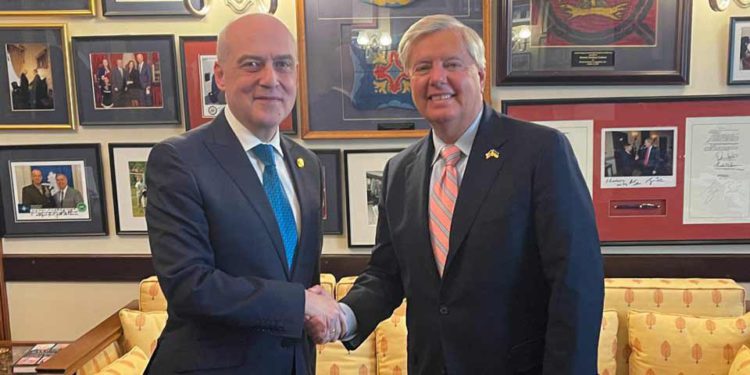State Dept Terminates Strategic Partnership with Georgia, U.S. Ambassador Resigns
The U.S. State Department has decided to punish the country of Georgia for refusing to become a replacement for Ukraine, and for voting to remain free from U.S/EU influence. Georgia says, fine – they prefer Donald Trump anyway!
The State Dept has terminated a strategic partnership with the nation of Georgia, choosing to end the relationship now that a new nationalist government has pulled back from joining the European Union. Additionally, U.S Ambassador David Zalkaliani has resigned his post in the country and will return to the USA.
U.S. Ambassador to Georgia, David Zalkaliani, stands with interventionist Lindsey Graham
Despite the official diplomatic withdrawals, as the western funded riots on the streets of Tbilisi continue, it would appear that Samantha Power (USAID) and the CIA are still conducting opposition operations within the country. ‘All your elections are belong to us.’
EUROPE – The United States suspended its strategic partnership with Georgia on Saturday, condemning the country’s decision to pause its efforts toward accession to the European Union amid unprecedented protests against the move.
“The decision by Georgian Dream to suspend Georgia’s EU accession process goes against the promise to the Georgian people enshrined in their constitution to pursue full integration into the European Union and NATO,” the State Department wrote in a statement. “By suspending Georgia’s EU accession process, Georgian Dream has rejected the opportunity for closer ties with Europe and made Georgia more vulnerable to the Kremlin.”
 Georgian Prime Minister Irakli Kobakhidze announced the suspension of EU accession negotiations on Thursday after the European Parliament criticized the country’s recent election as “neither free nor fair.” Thousands of protesters poured onto the streets in the days since, with sources on the ground telling POLITICO that part of the Georgian parliament building had caught on fire Saturday night. Georgian police have been quick to clamp down, using water cannons, tear gas and pepper spray to quell demonstrations.
Georgian Prime Minister Irakli Kobakhidze announced the suspension of EU accession negotiations on Thursday after the European Parliament criticized the country’s recent election as “neither free nor fair.” Thousands of protesters poured onto the streets in the days since, with sources on the ground telling POLITICO that part of the Georgian parliament building had caught on fire Saturday night. Georgian police have been quick to clamp down, using water cannons, tear gas and pepper spray to quell demonstrations.
In its statement, the State Department condemned the “excessive use of force by police,” noting that the Georgian people “overwhelmingly support integration with Europe.”
Georgian media also reported on Saturday that Georgian ambassador to the U.S. David Zalkaliani resigned from his post. Zalkaliani has served as the country’s U.S. ambassador since April 2022.
Tensions in Georgia have escalated since the Moscow-aligned Georgian Dream party claimed victory in the country’s Oct. 26 election — a victory that opposition parties have contested, alleging election fraud. (read more)
When questioned about the outcome within Georgia recently, Russian President Vladimir Putin responded:
Question: Good afternoon, Konstantin Kokoveshnikov, Zvezda TV channel.
Recently, in many of Russia’s neighbouring countries, elections at various levels have either already taken place or are scheduled to occur in the near future. We can recall the aforementioned Georgia, as well as Abkhazia, Romania, and Moldova. Concurrently, the electoral process in many of these nations is frequently accompanied by mass protests. Politicians advocating closer ties with the West often accuse their opponents of seeking to deviate from the chosen democratic path, abandoning democratic values, and allege Russian interference in these elections.
From your perspective, do you perceive indications, conversely, of Western interference in the electoral processes of such countries? Do you foresee the threat of new “orange revolutions?” Moreover, how do you personally interpret the sentiments of an apparently substantial segment of the electorate in these countries, who seem inclined to restore severed relations with Russia?
Thank you.
 Vladimir Putin: First and foremost, I want to assure you, and you can trust me that this is the truth, or very close to the truth. Despite the numerous interactions with countries of the former Soviet Union, including, for instance, Georgia, where there is likely mutual influence from Russia to Georgia and vice versa, at the official level, we do not meddle in domestic political processes. We do not intervene at all; we do not engage with it, we simply refrain from involvement.
Vladimir Putin: First and foremost, I want to assure you, and you can trust me that this is the truth, or very close to the truth. Despite the numerous interactions with countries of the former Soviet Union, including, for instance, Georgia, where there is likely mutual influence from Russia to Georgia and vice versa, at the official level, we do not meddle in domestic political processes. We do not intervene at all; we do not engage with it, we simply refrain from involvement.
Regarding Western interference, I cannot make the same statement about our Western “colleagues,” if you will. Why? Because if we examine the number of participants from various non-governmental organisations funded by foreign governments, as well as the number of individuals who attend protest rallies – considering their family members, friends, and so forth – we obtain a very realistic depiction of the crowds on the street and the number of individuals receiving funds from foreign governments for political activities within these countries. Just look at it objectively – this is semi-open information – and everything becomes immediately clear. He who pays the piper calls the tune, and indeed, they play it in the squares. Hence, there is interference.
When the events in Georgia unfolded, I must admit, I was taken aback watching and observing all this. I am surprised. We have no relations with them, with the present leadership of Georgia, none whatsoever. Yet, I was quite astonished by their bravery and the character they displayed in defending their viewpoint. I won’t even make assessments of this viewpoint at the moment. To a large extent, similar processes are occurring in the other countries you mentioned. If you find this response satisfactory, there is nothing further to add. (link)
TBILISI – Georgian Prime Minister Irakli Kobakhidze on Sunday said his Government’s relationship with the incoming president-elect Trump’s administration in the United States “matters most to us” and “everything else is secondary”, expressing confidence his inauguration would “essentially alter” the country’s relations with both the US and the European Union.
In his comments over the US Department of State’s announcement on the suspension of the Strategic Partnership with Georgia on Saturday, following the Georgian Government’s decision to halt accession talks with the EU, Kobakhidze claimed the outgoing administration was “striving to leave utmost difficult legacy” for the incoming Trump presidency.
“They are doing this in relation to Ukraine and Georgia, though it cannot have any fundamental importance”, the PM said and compared the current American leadership to the outgoing Georgian President Salome Zourabichvili, calling them both “temporary phenomenon”.
At a press conference, the PM also confirmed the Government had “indirect communication with the Trump’s team and were “waiting for the direct contact”.
Highlighting Trump’s influence on the future of Georgia’s EU integration, he reiterated the bloc’s membership as the country’s main foreign policy priority, which was “enshrined in Georgia’s Constitution” and affirmed his readiness to consent to the opening of negotiations “if such an offer is made by the EU”. (read more)
Georgian Prime Minister Irakli Kobakhidze







Post a Comment